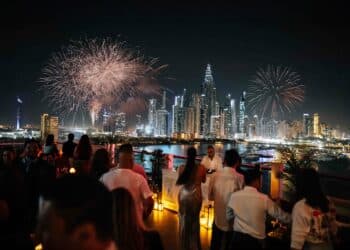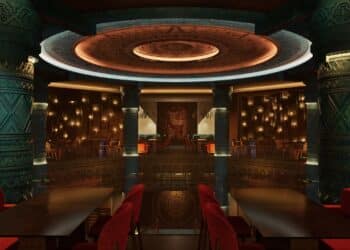The day after Jordan signed a historic agreement to create incentives for hotel development, the country also launched its new summer tourism campaign, “Yes, it’s Jordan”. Hotel News ME met with the country’s Minister of Tourism and Antiquities, Nayef Hmeidi Al Fayez to talk tourism developments, private sector partnerships and how the country plans to generate 18% of GPD from tourism by 2025. 
The Hashemite Kingdom of Jordan has captivated travellers from across the world for centuries. From the melancholy, primeval starkness of Wadi Rum, the teeming centre of urban Amman, the majestic ruins of bygone civilizations to the timeless grandeur of the Dead Sea. But as rich as Jordan is in culture and history, it has also been busy reviving the interest of next generation travellers through a vibrant new stream of luxury hotels emerging in Amman, Petra, Aqaba and the Dead Sea, all home to a fresh display of modern meeting facilities and stay venues.
Working towards reinvigorating the tourism offering in Jordan, authorities launched its first ever summer campaign: “Yes, it’s Jordan”, with a series of catchy adverts targeting the GCC and Jordanian expatriates. The campaign, which started in Dubai during Arabian Travel Market 2016, promotes the Kingdom as home to a variety of tourism products such archaeological sites, adventure tours, natural attractions and modern living. The Jordanian Minister of Tourism and Antiquities, Nayef Hmeidi Al Fayez unveils the pillars of this riveting new campaign and the importance of incentives in driving foreign investment to the region.
Driving down the bustling highways in Dubai, more notably than others, Sheikh Zayed Road to be precise, you will have no doubt seen the words: “Yes, it’s Jordan”, but what does it all mean? Nayef Hmeidi Al Fayez, Jordan’s Minister of Tourism and Antiquities is a man on a mission, with big plans to attract Jordanian expatriates and GCC travellers to the region, spanning much further afield than the lost city of Petra.
This exciting new campaign has two pillars — the first targeting Jordanians living in the Gulf region as it seeks to encourage them to spend their annual holidays in the Kingdom, as Al Fayez explains: “Expatriates take long holidays every year in the summer, and most of them tend to travel abroad, as cheap flights are available in the domestic market by low-budget airlines. The advertisements from the Jordanian Tourism Board are aimed at convincing expats to spend their vacation in attraction-rich Jordan.
“The second pillar, is targeting nationals of Gulf Arab states by running advertisements for three types of tourism products available in Jordan. Adverts and TV commercials have been launched focusing on historical and archaeological sites, such as Wadi Rum and Dana. While the third part is to market Jordan as a modern destination for shoppers and leisure vacationers.” He explains.
With tourist arrivals already on the rise and latest figures from the Jordanian Tourism Board reporting that arrivals increased to 73,600 in April 2016 from 64,000 in March of this year, the question of how much of a boost to these numbers the summer campaign will realistically have, Al Fayez explains: “It’s always exciting to talk about tourism in general, but even more so in Jordan. Jordan has been moving to increase the capacity of the tourism industry and at the same time it has a product that is almost unique with so much to offer for investors and tourists.”
He continues: “Hotels, including those branded by international chains, have operated in the country for a long time with most of the international hotel chains already here and those which are not yet are coming in.”
Eyeing up investment
When discussing the potential for new hotels and attracting new investment to keep up with growing demand, Al Fayez confidently explains: “Today, the capacity stands at around 28,000 rooms and we aim to develop another 30,000 rooms under our current strategies. As part of our strategy to look at investment into Jordan, from this region and also on a global scale, we see it has been strong and today we have the UAE investing heavily in tourism projects, especially in Aqaba and Amman. The next step is to expand on this investment and also attract the investment of others.”
 With Al Fayez keen on attracting other key investors outside of the UAE, incentives such as the Investment Law No. 30 and Government schemes have been set in motion to pique the interest of outside investors, he explains: “In 2014 we issued Investment Law No.30, which covers many things, not just the tourism industry, but an important segment of that law is focused on the tourism industry, and this helps to encourage investment.”
With Al Fayez keen on attracting other key investors outside of the UAE, incentives such as the Investment Law No. 30 and Government schemes have been set in motion to pique the interest of outside investors, he explains: “In 2014 we issued Investment Law No.30, which covers many things, not just the tourism industry, but an important segment of that law is focused on the tourism industry, and this helps to encourage investment.”
He adds: “On April 27, a government initiative was launched to encourage tourism development and investment in areas outside of Amman. This is one of many incentives we have given to drive investment across the country. As a destination Jordan is a diverse product and there are geographical areas in the country that require investment in hotels, restaurants and entertainment. Accordingly, we have taken a decision and that has now been passed by the cabinet, providing an additional investment opportunity for the hotels, restaurants, entertainment and conferences segments.”
These momentous steps to grasp the interest of investors follow earlier measures which saw visa costs in Jordan abolished under certain criteria and a reduced electricity tariff on hotels in certain areas explains Al Fayez. “Usually investors are the least risky in their business; they don’t always want to venture into something new. So to encourage them we are giving them a reason to invest. For example, there is a 50% reduction in the taxes applied to such developments; we have sales tax reductions; special economic zones, and other measures.”
Clearly a firm believer in the new incentives, Al Fayez avidly explains: “You cannot zone tourism, but we have applied these incentives to all 12 governorates, even in the capital. I’m so excited about this. I think it will have a very positive impact on creating new areas for investment and the tourism industry in general.”
Disclosing how these incentives materialise into a reality, he continues: “As the Minister of Tourism you take these ideas to the government as a way to work with the private sector and encouraging those entities to develop in new areas.”
He adds: “We took all the elements, that from our conversations would encourage investment in these areas, and we translated them into real action. Once that is done the idea has to go through the Investment Authority we created, which is headed by the Prime Minister and cabinet members, plus private sector members, and that follows on the Investment Law.”
Elaborating on how gaining approval for such significant incentives can often become lengthy processes, he says: “After consulting with the private sector, the process began in March 2015, when I had gathered all the feedback on which we created the law. This law is something the private sector has been asking for, for many years, and while incentives already exist this is an additional measure to further support that.”
Creating allies
When looking at the private sector and merging partnerships, many tourism boards spend much time deliberating on “the right kind of stakeholder”, and with the new summer campaign, whilst quizzing Al Fayez on tour operators, hotel owners and major airline partnerships, his overall stand is: “We are definitely open for business.”
“We are looking to engage as many brands as possible. Jordan is not a mass tourism destination, we have niches. If you look at the quality of our hotels, they meet international standards, but at the same time we are focusing on bringing quality in terms of ROI, return on the country’s economy.
“It is easy to say we want to target 100,000 rooms, but they need to be focused on the niches we have and also fit in the segments we need.”
Securing new rooms for Jordan isn’t the only sector Al Fayez is looking to grow, highlighting the importance of airline deals he says: “Today, our national carrier is an important element of our partnership, but we understand we must partner with other airlines too. We are speaking to Emirates Airlines and a number of other major airlines here [UAE] about partnerships, first of all looking at connectivity, reach, and accessibility. Then we also look at the ability for an airline to link Jordan to the rest of the world. It is a win-win situation.”
In tandem with the three pillars of the “Yes, it’s Jordan” campaign, Al Fayez is keen on building lasting partnerships with key tour companies in the private sector, he says: “With the other stakeholders in the private sector, we are always looking to work with new tour operators in the UAE and globally and there are even local operators who work globally. Competition is important in order to keep the quality high.”
Aligning strategies
Since the introduction of Jordan’s hotel classification system in 2011, standards in the industry have gone from strength to strength, but often measuring the development of any law changes can be tough as Al Fayez explains: “We felt in 2011 that we had to update the system and we worked with international organisations, in partnership with the Jordan Hotel Association to implement the system. At this stage we are reviewing the success of that because we are also reviewing the by-law of the hotel industry to identify any flaws and update accordingly.”
He adds: “We are also reviewing all other tourism industry by-laws, for tour operators, restaurants, tour guides and hotels, for example, to reflect the changes that have occurred in the tourism industry in general.”
With a new five-year tourism cycle having begun at the start of 2016, Jordan introduced the 2025 Government plan with much emphasis on the tourism industry, outlining the ambitions of this strategy, Al Fayez explains: “In these strategies we look at capacity, human resources, the empowerment of women in the industry – because we see that there are not many in the industry – product development, marketing and the by-laws. It is a strategy that has to always be updated. The private sector is the key partner in this industry and we guide and facilitate things but we need them to be involved. This is what they need and we try to work together in continuing this.”
And with a desire to double the number of rooms in the country, disclosing the standpoints to increase visitor numbers he continues: “Numbers have to increase, but there are two types of visitor, same-day visitors and overnight stays. Our focus has always been on the overnight visitor. What we have seen over the last five years is a decline in the same-day visitor, but with stability in the over-night segment. Our aim now is to see how we increase the average length of stay from the current 3.2 nights to hopefully, for example, 6.2 nights. Jordan is rich in historic and natural attractions and activities to cater to those longer stays.
“We are currently still calculating the actual number in order to benefit the economy because in 2015 events in the region prevented us from reaching our previously goal. Not reaching that number was a loss for us but with the capacity of the hotels and growth of the room numbers, we need to increase the length of stay and the arrival numbers.”
Target markets and achieving goals
Jordan has the capacity to cater to global markets, and one very important market for the region is the UAE and sectors from across the GCC who frequent Jordan not only in the summer months but on a regular basis. So with such a large expat community in the UAE who already understand the regional and national geography better, Jordan is on a mission to capture other traditional international markets with “a focus on Europe, the US and Middle East.”
Eyeing up other markets, he explains: “We also have big opportunities looking East at India, China, Korea and Japan, all those countries have great potential and that is why we are creating all these partnerships. You need the airlift to achieve this so we are seeking new and strategic partners for that.”
Elaborating on the 2025 Government Plan Al Fayez says: “The percentage of total GDP generated from tourism is currently at 12-13%. Our aim is to bring it to somewhere close to 18%. That is very ambitious, but we hope we can do it as we accept the challenge.”
Looking at tourism sectors, Al Fayez predicts “30% of tourism should be generated from medical and wellness tourism, as a minimum. There is huge potential in this segment and it is very important. We have an abundance of qualified physicians, dentists and other medical professionals all practicing to international standards. For medical tourism we are already number one in the region and fifth globally.”
Ending on a high note, Al Fayez concludes: “Jordan has invested more in 4- and 5-star hotels and the size and quality of what we want requires 30,000 additional rooms, across all sectors.”


































































